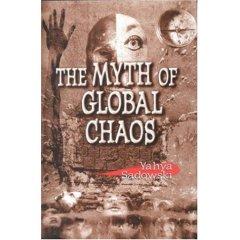| 2020ok Directory of FREE Online Books and FREE eBooks |
Free eBooks > Nonfiction > Politics > General > The Myth Of Global Chaos
The Myth Of Global Chaosby Yahya M. Sadowski  Download Book (Respecting the intellectual property of others is utmost important to us, we make every effort to make sure we only link to legitimate sites, such as those sites owned by authors and publishers. If you have any questions about these links, please contact us.) link 1 About Book Book Description When the Cold War ended in 1989, American hopes for a new world order were quickly disappointed. A new wave of violence soon erupted, engulfing places from Rwanda and Somalia to Chechnya and Bosnia. These new "clashes of civilizations," fundamentalist jihads, and ethnic massacres appeared to be more savage and less rational than the long twilight struggle with the USSR, during which Washington's adversary was clearly identified and relatively predictable. In an effort to understand these post-Cold War conflicts and to advise the government on how to deal with them, a new school of foreign policy thought has developed. Dubbed "chaos theory," it argues that the much heralded processes of globalization are actually breeding a reaction of irrational violence. Thus, the spread of Western cultural icons through new electronic media often shocks and offends moral sensibilities in traditional societies. The explosive growth of international commerce has triggered a wave of migration and urbanization that throws together people from different cultures and fertilizes xenophobia. Chaos theory has already won converts in the U.S. military, the intelligence community, and the foreign service. Its influence has been manifest in an array of policies, particularly during the U.S. engagement in Bosnia. But chaos theory is mostly wrong. In this book, the author outlines the growth of chaos theory and its growing influence, and then provides a thorough empirical critique. Using detailed studies of Bosnia and global comparisons, he shows that globalization has not played a decisive role in fueling recent conflicts. Indeed, journalists' impressions notwithstanding, there is no evidence that since 1989 warfare has become more savage or even more frequent. The advocates of chaos theory are thus urging the U.S. to invest in preparing for a threat that is largely mythical--a strategy that is at least wasteful and potentially dangerous. The author argues that the most useful tools for preventing or prosecuting post-Cold War conflicts remain the same ones that worked in the recent past: crafty diplomacy, conventional military preparedness, and expanded support for economic development. Card catalog description After the cold war ended in 1989, American hopes for a new world order were quickly disappointed. A wave of violence soon erupted, engulfing regions from Rwanda and Somalia to Chechnya and Bosnia. These "clashes of civilizations," fundamentalist jihads, and ethnic massacres appeared to be more savage and less rational than had been the long twilight struggle with the former Soviet Union. In an effort to understand these post-cold war conflicts and to advise the government on how to deal with them, a new school of foreign policy thought developed. Dubbed "chaos theory," it argues that the much-heralded processes of globalization are actually breeding a reaction of irrational violence. Chaos theory has already won converts in the U.S. military, the intelligence community, and the foreign service. It has influenced an array of policies, particularly during the U.S. engagement in Bosnia. In this book, Yahya Sadowski outlines the growth of chaos theory and its growing influence, and then provides a thorough empirical critique. Using detailed studies of Bosnia and global comparisons, he shows that globalization has not played a decisive role in fueling recent conflicts. Indeed, journalists' impressions notwithstanding, there is no evidence that warfare has become more savage or even more frequent since 1989. The author argues that the most useful tools for preventing or prosecuting post-cold war conflicts remain the same ones that worked in the recent past: crafty diplomacy, conventional military preparedness, and expanded support for economic development. About the Author Yahya Sadowski is associate professor of Middle East studies and comparative politics at the John Hopkins School of Advanced International Studies and a former senior fellow in the Foreign Policy Studies program at the Brookings Institution. He is the author of Scuds or Butter? The Political Economy of Arms Control in the Middle East (Brookings, 1993) and Political Vegetables? Businessmen and Bureaucrat in the Development of Egyptian Agriculture (Brookings, 1991). Related Free eBooks
| Related Tags |












SEND A COMMENT
PLEASE READ: All comments must be approved before appearing in the thread; time and space constraints prevent all comments from appearing. We will only approve comments that are directly related to the article, use appropriate language and are not attacking the comments of others.